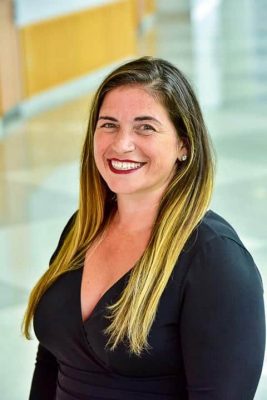October 26, 2022
Celebrating Title IX: Dr. Amy Giddings

by: Madison Beecher
Dr. Amy Giddings currently serves as a Professor and Department Chair of Temple University’s Sport and Recreation Management program, Academic Director of the Master of Science in Sport Business, and Assistant Director of the Sport Industry Research Center (SIRC).
Prior to her career in sport, Dr. Giddings saw herself as an athlete for as long as she could remember. Growing up, her mother was a PE teacher and her grandfather was an avid sports fan, taking Giddings to all her sporting events and encouraging her competitive nature. She played basketball, volleyball, and softball all throughout high school. “I’ve always been an athlete.” Giddings shared, “That’s how I identify myself.”
Once she began college at the University of Dayton, Dr. Giddings decided to take time away from sports to focus on academics, but the hiatus didn’t last long. “I wanted to be a regular student and see what it was like to be like everyone else who didn’t play sports,” she explains, “That didn’t even last more than a few weeks. I realized then that being an athlete was who I was.” Her college roommate invited her to join the rowing team and it was then she found her lifelong love for the sport. Dr. Giddings soon became a rowing star, earning multiple accolades including the title of a two-time U.S. Rowing Champion, finishing in the top 10 at the 2000 World Indoor Rowing Championships, winning the 2001 I-lan International Invitational in Taiwan, and was part of the women’s senior quad that captured gold at the prestigious Royal Canadian Henley Regatta in 2002.
Building on her rowing experience, Dr. Giddings has coached the sport for over 20 years at multiple levels. She started her coaching journey as a graduate student at Temple University coaching in a program called “Learn to Row.” When her husband took a rowing coach position in 2000 at Conestoga High School, Dr. Giddings became the novice coach alongside him. Both were instrumental in creating a successful rowing program for 17 years, earning their team countless city, state, and national medals.
Dr. Giddings’s coaching extended beyond rowing. While on the faculty at Drexel University, she realized she wanted to share the experience of coaching at an academic level. In 2006, Dr. Giddings created the Master of Science in Sport Coaching Leadership at Drexel University. “I was really passionate about combining my love for coaching with sports education and helping other coaches develop professionally,” Dr. Giddings explains, “I can’t think of a better way to develop a young person than through sports and coaches are the key to that development.” Influenced by the creation of the growing coaching program at Drexel University, Dr. Giddings founded the annual Philadelphia Coaches Conference in 2015 to create a safe space and open forum for coaches to come and connect with each other and learn from their shared experiences.
The founding of this collaborative event created the opportunity for Dr. Giddings to work with community organizations, including the Philadelphia Youth Sports Collaborative, assisting with coach development in under-resourced communities. She developed the Certificate in Sport Leadership program, which allows coaches in the Philadelphia region, particularly those working in under-resourced areas, to have access to high-quality content from a variety of coach education providers.
Dr. Giddings says her passion for encouraging students, especially young women, to consider sports leadership and coaching as a career was in part, due to Title IX legislation and how it impacts college sports. “It was a big component of why I was able to continue rowing in college and continue my education,” she says, “I wouldn’t have been able to have access to any of that without Title IX legislation.” That foundation, as she says, led her to create The Women’s Coaching Network, which includes both the Women in Coaching blog and the Real Women of Coaching video series where female coaches would not only consider a career in coaching but allow them to create community with other women as well. While these outreach efforts have since concluded, at the time they were novel – they showed women that women do coach and coach at a high level!
Dr. Giddings now focuses her efforts on working with organizations and individuals to determine ways in which they can improve their coaching. While she misses the day-to-day of coaching, she continues to live vicariously through the coaches she works with!